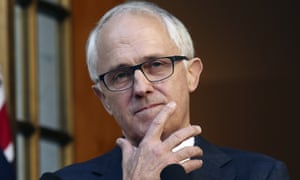Extract from The Guardian
It is a revealing choice of ministers that shows
something of the new prime minister’s agenda – and the status of
his support within the party
Malcolm Turnbull announces his new cabinet at
parliament house in Canberra on Sunday. Photograph: Rob Griffith/AP
Lenore
Taylor Political editor
Sunday 20 September 2015 18.37 AEST
He won’t die wondering – this
reshuffle is big.
Joe Hockey, Eric Abetz, Kevin Andrews, Ian
Macfarlane and Michael Ronaldson are all out.
Although most were on the Daily
Telegraph’s list of ministers Abbott was thinking of demoting
anyway, Turnbull has not responded to threats of retribution or
destabilisation by proceeding with hesitation or caution.
Twenty-first century government requires changes, he says, which
seems to imply something about the modernity of his predecessor.
The
conservative far right is threatening to split from the Liberal
party, there is talk of resignations from some branches and an
unnamed but diligent conservative is putting together
stopturnbull.com – a website
dedicated to proving Turnbull is a kind of Labor/Green sleeper agent
who has infiltrated the Liberal party in order to destroy it.
Turnbull has ignored all that and chosen to seize the day. Tough
calls, he says, are “what leaders have to do.”
This ministry is more moderate than the
one it replaces, and Malcolm Turnbull’s backers got the biggest
promotions.
The biggest winners in the reshuffle – Marise
Payne as the nation’s first female defence minister, communications
minister Mitch Fifield, education minister Simon Birmingham, small
business minister and assistant treasurer Kelly O’Dwyer – were
all Turnbull backers. George Brandis, another Turnbullite, has become
leader of the government in the Senate. Most of the assistant
minister winners were Turnbull backers too.
Scott Morrison – the biggest winner of all –
voted for Tony Abbott but has been accused of not encouraging his
supporters to follow suit.
Two Abbott backers were elevated – Christian
Porter to social services and Josh Frydenberg entering cabinet in the
resources portfolio. The best news most Abbott backers got was that
they could keep the jobs they already had – Peter Dutton in
immigration, Andrew Robb in trade, Mathias Cormann in finance, Greg
Hunt in environment.
He’s matched Labor in representation of
women.
Bill Shorten has five women in his shadow cabinet.
Late last year Tony Abbott doubled his female cabinet representation
- to two. Malcolm Turnbull has five: Julie Bishop, who stays as
foreign minister and Sussan Ley who stays in health, as well as
Payne, O’Dwyer, and Michaelia Cash, who takes employment. All the
newcomers were “good and talented women” who Abbott said were
“knocking
on the door” of cabinet. That door’s now open.
It wasn’t always pretty.
Bruce Billson – the very energetic and now
former small business minister – turned down the demotion of the
outer ministry cities portfolio, which left an opening for Abbott
supporter Jamie Briggs.
Turnbull was upfront that neither of his friends
Ian Macfarlane or Michael Ronaldson wanted to finish their
ministerial careers. Kevin Andrews took the unusual step of
announcing his own demotion before Turnbull unveiled his ministry.
Women take key roles in Malcolm Turnbull’s
cabinet. Link
to video
Strong speculation suggests the disappointed Joe
Hockey may be heading to Washington to replaceKim Beazley as
ambassador.
He’s sneaked in little checks and
balances.
To secure a new Coalition agreement with the
Nationals, Turnbull agreed
to transfer responsibility for water policy (although not the
water trigger in the Environment Protection and Biodiversity
Conservation Act) to the agriculture minister, Barnaby
Joyce, from the environment minister, Greg Hunt. Last week he
said environmentalists should not be too concerned about this because
the bulk of the work on water reform had been finished. In the
fineprint of the reshuffle he also made South Australian senator Anne
Ruston assistant minister for water, giving that state an assurance
of close scrutiny of any decisions that might impact on its supply of
water.
Arthur Sinodinos, whose careful management style
as John Howard’s chief of staff was a factor in the former prime
minister’s longevity in government, has become cabinet secretary.
In fact with Howard’s former “enforcer” Tony Nutt overseeing
the prime ministerial transition and his old press secretary Tony
O’Leary lending a hand for a while, the office changeover had a
back to the future flavour.
He had the good sense not to give
Christopher Pyne the defence portfolio.
Pyne had
been tipped to take the defence portfolio, even though that
appointment would have raised a perception that he would favour his
home state of South Australia in the $50bn submarine contract
currently the subject of a competitive evaluation process. Turnbull
gave him industry, innovation and science instead, a portfolio he
says is critical to Australia’s economic future.
More change is coming.
Turnbull – an enthusiastic user of public
transport – indicated he would ditch the Abbott government’s
decree that federal funding would flow only to roads, leaving the
states to handle public transport. There was “no place for
ideology” in transport funding, he said.
Government sources also predict the quiet ditching
of so-called
“lawfare” changes to stop challenges to developments under
federal environment laws, like
the one that delayed Adani’s $16bn Carmichael mine, which were
already facing defeat in the Senate.
Turnbull’s promise to the Nationals to take
controversial competition law changes back to cabinet takes on a
whole new meaning now the small business minister is the economic dry
Kelly O’Dwyer rather than the enthusiastic advocate for the
changes, the now dumped Bruce Billson.
And, says the new prime minister, all governments
need to review policies, and if they’re not efficient, to change
them. The cabinet meets tomorrow afternoon, right after being sworn
in, to get started.

No comments:
Post a Comment